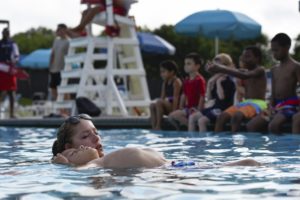 It’s the time of year for outdoor BBQs, sunshine, heat and FUN! What goes better with summer time than a dip in a nice, clear swimming pool? There is no better way to beat the heat than with a swim. Let us discuss premises liability and what dangers to look for when you and your family are at the pool this summer.
It’s the time of year for outdoor BBQs, sunshine, heat and FUN! What goes better with summer time than a dip in a nice, clear swimming pool? There is no better way to beat the heat than with a swim. Let us discuss premises liability and what dangers to look for when you and your family are at the pool this summer.
Child drownings occur frequently and happen to even the most vigilant parents
Child drowning is a second-leading injury-related cause of death among children. 775 children drowned in just one year from 2001-2002. While child drowning rates are on the decline, many tragedies continue each year. The children most at risk for child drowning are from ages 1-4 years old. Most of these child drowning deaths occurred in residential pools, where most adult drowning deaths occur in natural waters. The majority of child drowning deaths occur while one or both parents are home and the child was last seen in the home and out of sight for less than five minutes.
Many drownings occur silently. Movies and TV shows have given us a sense that when people are drowning their are lots of splashes and screams to alert someone who could help. The reality is that most people who are drowning can only splash at the surface of the water for about 20-60 seconds before they become submerged. Once submerged, drowning occurs after just 3-4 minutes. Submersion makes it more difficult to tell if someone is drowning because it can appear they are simply swimming underwater.
Prevent child drowning by checking for safety measures at all pools
If you’re at a swimming pool, you should always check to see if a lifeguard is present. It is a good idea to practice extreme caution whether a lifeguard is present or not, but a lifeguard is an extra set of eyes on you and your children while swimming. You can also check the pool for life saving devices. It’s better to know where they’re located if you need them, rather than having to search and waste precious seconds. Young children are often victims of accidental drowning when a drain in a pool they’re using is not equipped with a proper drain cover. Flat drain grates are EXTREMELY dangerous to not only children, but adults, as well. When using a flat drain grate, the suction is so great that if your body becomes sucked in by the drain, you will likely not be strong enough to remove yourself from the suction to come up for air. It is important to inspect EVERY pool you and your children are using for proper drain covers. A proper drain cover will be raised and likely dome-shaped. This allows full flow of the water to the drain without the suction being able to get close enough to your skin to entrap you.
Residential pool safety is possibly more important than that of a public pool. Public pools generally take extreme precautions to prevent child drowning deaths. Residential pools often have less supervision than a public pool. People who have pools become relaxed and less vigilant about pool safety. In order to help prevent an accidental child drowning in your pool at home, make sure to have the following safety measures in place:
- A fence no shorter than 4 feet tall with a self-closing, self-latching gate which the latch is out of reach of children
- The fence should completely separate the pool from the house
- The door to the pool should have an alarm
- Install a rigid, power safety pool cover
- Install an underwater motion swimming pool alarm
- Have the child wear a child-worn water monitor alarm
While using the above safety measures, it is still possible for a child drowning to occur. It’s a good idea to teach children to swim at an early age so that they can better protect themselves from drowning. When near a pool, make sure to pay close attention to children of all ages and swimming capacities. Drownings can occur in the healthiest and most apt of swimmers of all ages, even adults. Never assume that you can make it across a body of water without a flotation device. Also beware of underwater hazards in natural water areas which could entangle you or a child.
You should also employ a very strict rule that small children always use a US Coast Guard approved life preserver while swimming or in water at all times. It’s also a good idea to consider hiring a lifeguard if you plan to host a pool party. Child drownings happen in an instant and are devastating. If your child was injured or the victim of a child drowning, call our firm today at 314-862-7222 to discuss your legal rights. You can also contact us online for a free consultation by clicking here.
